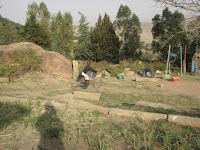Today I had an appointment to interview a local doctor. I had asked to speak with an HIV/AIDS specialist in Lesotho and was told that if they are a doctor in Lesotho, they ARE an HIV/AIDS specialist.
This doctor has been in Lesotho, practicing medicine for twelve years. He told me that 30% of his patients are HIV+, that he knows of. There were many details he shared with me about the progression of care in Lesotho, the financial costs of HIV on the country, and the psychological impacts of being born HIV+, becoming HIV+ later in life, or being affected by it.
There is still a lot of stigma around HIV/AIDS in Lesotho, and around the world. He believes we need new radical policies and thinkers to make a drastic change. He believes that many people still do not know their status, and there is great fear around knowing. People in Lesotho are very well educated about protection, there are condoms everywhere- I don't know how many washrooms I was in that had containers full of free condoms. The country is working tirelessly to stop the spread of HIV/AIDS. Women are disproportionately affected by HIV and AIDS in Lesotho. Inequality in HIV prevalence begins in early life, with HIV almost twice as prevalent amongst young women (10.5%) than young men (5.8%) aged 15-24yrs old (Avert). Gender based violence has been found to be a significant driver for the increased HIV prevalence among women.
The doctor spoke of many side effects of having HIV/AIDS, the side effects of the drugs, as well as a high rate of hypertension in many of his patients. Lesotho has the second highest rate of HIV in the world. Currently 1 in 4 people in Lesotho are HIV+. This has left a generation of children behind, creating 200,000 orphans in Lesotho. 1 in 10 people in the country are orphaned children. These may be just stats, they are devastating. They need to change.
The doctor told me that there is a lot of kidney failure in Lesotho, and that all publicly funded dialysis must happen in South Africa. As many of you know, I had a kidney transplant in 2009 and was on both hemodialysis and peritoneal dialysis before getting my gift of life.
When you are diagnosed in Lesotho, you are prescribed six months of dialysis through public health care, and after that you have to pay for it on your own. Each session can cost up to 2500R, which is $250 Canadian, a steep price for survival. When I dialyzed at Grand River Hospital, I did it three times a week, and if my levels weren't great, they would ask to have me in a fourth time. There was no bill at the end of the five hour treatment.
To dialyze up to Canadian healthcare standards, you would get three treatments a week. In South Africa you would pay $250 per session, so $750/week x 4 weeks/month x 12 months/yr= $36,000 per year to dialyze. To put in perspective how much it would cost to SURVIVE with kidney disease, the World Bank has stated that Lesotho's per capita income, is $2,494. Yes, you read that right. That's $2,494 per year. $36,000 per year for dialysis on a $2,494 income.
Now imagine having to face the fact that you need dialysis to survive, and it is only funded publicly for six months. Doc said bluntly to me "it's a death sentence, it's six months to live".
We moved on from kidney disease, and began discussing general health care. Doc said the amount of patients per doctor, and hospital beds per doctor are simply unmanageable. The World Bank has stated that Lesotho has on average 1.7 doctors per 1,000 hospital beds. The need for doctors in Lesotho is astronomical. The need for care and support is desperate.
I don't mean to continually harp on the idea that we are extremely lucky to live in Canada, but even when we look at the ARVs (antiretroviral therapy-medication used for HIV/AIDS), we have more than forty choices of what Doc calls "ARV cocktails". In Lesotho, there are 2-3 choices. When discussing "cocktails", it means a combination of the drugs that you take to create a mixture that works well in your body, with the least amount of side effects that fights against the virus.
Over and over we are reminded that there are people around the world who do not have the same rights and privileges that we do here in Canada. Incredible public health care has been the difference between me being alive today or not.
I was born in Burlington, Ontario. Little did I know then, that meant I would live to see six months past my diagnosis...fast forward eight years later and I am sitting in front of a man who is telling me if I were born here in Lesotho, I would have died in January of 2009.
I have been given the opportunity to live past my six months. What have I done past my six months?
I finished my University degree, I married my best friend, I found the career of my dreams, I bought my first home, I travelled to Lesotho and I wake up every day without tubes, without dialysis, with a brand new kidney, able to enjoy a hot shower, smile at my scars, have the energy to go to work and the ability to live the life I have always strived for.
For more information about Bracelet of Hope, feel free to contact me at ccoghlan@braceletofhope.ca or check out our website at www.braceletofhope.ca
Love.





















































